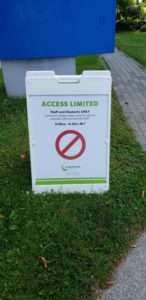After weeks of lockdown, BC is now deep into phase two of its COVID-19 recovery strategy, and, assuming transmission rates of COVID-19 stay low, is set to enter phase three sometime in June, meaning that more restrictions will be lifted and citizens can ease into a “new normal.” After the bizarre and distressing experience of a sudden worldwide social anxiety, where every person is considered a lethal threat and we’re terrified of each other, the slight relaxation of the physical-distancing rules feels incredibly cathartic.
However, this is the period where we cannot allow our relief to compromise critical thinking by blindly accepting new policies without examination and criticism. In our excitement for a little more leeway, it’s not a stretch to imagine restrictions that forfeit our personal freedoms beyond what is actually necessary being inappropriately maintained.

We need to be sure we don’t let a “new normal” mean that we’re agreeing to an indefinite confiscation of freedom—not necessarily because of legislation, but as a result of our own subservience. All that’s needed to transform a system of control is to disguise an appeal to fear as an appeal to logic and we will relinquish our own freedom willingly. Don’t be complacent, and don’t hold the naive trust that the powers that be will always act in our best interest.
Our social structure is incredibly malleable. It took only two weeks for the complete collapse of our socioeconomic systems because the government dictated suggested guidelines of behavioural restrictions, and nearly everybody submitted to them without question, because we were scared. Since the beginning of the pandemic, I’ve been watching an increasing number of instances of anxiety-based overreacting all around the world, and, in my opinion, this has extended to the development of long-term recovery strategies. Although BC’s current COVID-19 policies are relatively temperate, we’re only a suggested guideline or two away from joining the ranks of the unreasonable.
Even as we celebrate our society reopening, we must be hyper-vigilant and examine new policies for clauses that result in the long-term confiscation of personal freedoms. In these uncertain times, threat levels are constantly changing, and so is government policy. Decisions are made impromptu and rapidly, and in our heightened state of anxiety, we risk losing a grip on our faculties of reason and allowing ourselves to be hoodwinked. The burn is slow, and if we’re not careful, we could find that we’ve gladly built our society into a restrictive dystopia long before we’re aware of it.
